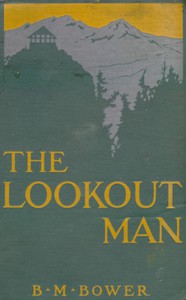The Lookout Man by B. M. Bower (good books to read for adults .txt) 📗

- Author: B. M. Bower
Book online «The Lookout Man by B. M. Bower (good books to read for adults .txt) 📗». Author B. M. Bower
Jack studied the chart like a boy investigating a new mechanical toy. He was so interested that he forgot himself and pushed his hair straight back off his forehead with the gesture that had become an unconscious mannerism, spoiling utterly the plastered effect which he had with so much pains given to his hair. But Hank and the fireman were neither suspicious nor observing, and only laughed at his exuberance, which they believed was going to die a violent death when Jack had spent a night or two there alone.
"Is that all I have to do?" he demanded, when he had located a half dozen imaginary fires.
"That's all you get paid for doing, but that ain't all you have to do, by a long shot!" the fireman retorted significantly. But he would not explain until he had packed his bed on the horse that had brought up Jack's bedding and the fresh supplies, and was ready to go down the mountain with Hank. Then he looked at Jack pityingly.
"Well—you sure have got my sympathy, kid. I wouldn't stay here another month for a thousand dollars. You've got your work cut out for you, just to keep from going crazy. So long."
Jack stood on a little jutting pinnacle of rock and watched them out of sight. He thought the great crater behind the station looked like a crude, unfinished cup of clay and rocks; and that Crystal Lake, reflecting the craggy slope from the deeps below, was like blueing in the bottom of the cup. He picked up a rock the size of his fist and drew back his arm for the throw, remembered what the supervisor had told him about throwing stones into the lake, and dropped the rock guiltily. It was queer how a fellow wanted to roll a rock down and shatter that unearthly blue mirror into a million ripples.
He looked away to the northwest, where Mount Lassen sent a lazy column of thin, grayish vapor trailing high into the air, and thought how little he had expected to see this much-talked-of volcano; how completely and irrevocably the past two days had changed his life. Why, this was only Tuesday! Day before yesterday he had been whooping along the beach at Venice, wading out and diving under the breakers just as they combed for the booming lunge against the sand cluttered with humanity at play. He had blandly expected to go on playing there whenever the mood and the bunch invited. Night before last he had danced—and he had drunk much wine, and had made impulsive love to a girl he had never seen in his life until just before he had held her in his arms as they went swaying and gliding and dipping together across the polished floor, carefree as the gulls outside on the sand. Night before last he had driven home—but he winced there, and pulled his thoughts back from that drive.
Here were no girls to listen to foolish speeches; no wine, no music, no boom of breakers, no gulls. There never would be any. He was as far from all that as though he had taken flight to the moon. There was no sound save the whispering rush of the wind that blew over the bare mountain top. He was above the pines and he could only faintly hear the murmur of their branches. Below him the world lay hushed, silent with the silence of far distances. The shadows that lay on the slope and far canyons moved like ghosts across the tumbled wilderness.
For a minute the immensity of silence and blue distance lulled his thoughts again with the feeling of security and peace. He breathed deep, his nostrils flared like a thoroughbred horse, his face turned this way and that, his eyes drinking deep, satisfying draughts of a beauty such as he had never before known. His lips were parted a little, half smiling at the wonderful kindness of fate, that had picked him up and set him away up here at the top o' the world.
He glanced downward, to his right. There went two objects—three, he counted them a moment later. He stepped inside, snatched up the telescope and focussed it eagerly on the slow-moving, black specks. Why, there went Hank Brown and the fireman, Ed somebody, and the pack horse with Ed's bedding lashed on its back. For perhaps a mile he watched them going down through the manzanita and buck brush toward the massed line of balsam firs that marked the nearest edge of the heavy timber line.
So that was the trail that led up to his eyrie! He marked it well, thinking that it might be a good plan to keep an eye on that trail, in case an officer came looking for him here.
He watched Hank and Ed go down into the balsam firs. Dark shadows crept after them down the slope to the edge of the thicket where they had disappeared.
He watched the shadows until they gave him a vague feeling of discomfort and loneliness. He turned away and looked down into the bottom of the mountain's cup. The lake lay darkling there, hooded with shadows like a nun, the snow banks at the edge indicating the band of white against the calm face. It looked cold and lonesome down there; terribly cold and lonesome.
Mount Lassen, when he sent a comfort-seeking glance that way, sent up a spurt of grayish black smoke with a vicious suddenness that made him jump. With bulging eyes he watched it mount higher and higher until he held his breath in fear that it would never stop. He saw the column halt and spread and fall....
When it was over he became conscious of itching palms where his nails had dug into them and left little red marks. He discovered that he was shaking as with a nervous chill, and that his knees were bending under him. He sent a wild-eyed glance to the still, purple lake down there where the snowbanks lingered, though it was the middle of May; to the far hills that were purpling already with the dropping of the sun behind the high peaks; to the manzanita slope where the trail lay in shadow now. It was terribly still and empty—this piled wilderness.
He turned and hurried into his little glass-sided house and shut the door behind him. A red beam of the sinking sun shone in and laid a bar of light across the chart like a grin.
The silence was terrible. The emptiness pressed upon him like a weight that crushed from him his youth and his strength and all his youthful optimism, and left him old and weak and faded, a shadow of humanity like those shadows down there in the canyon.
Stealthily, as if he were afraid of some tangible shape reaching out of the silence, his hand went to the telephone receiver. He clutched it as drowning fingers clutch at seaweed. He leaned and jerked the receiver to his ear, and waited for the human voice that would bring him once more into the world of men. He did not know then that the telephone was the kind that must





Comments (0)